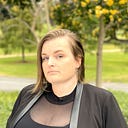Neurodiverse Me
In December 2022, I was diagnosed with ADHD. It was a struggle to accept the diagnosis at first, since my brother was diagnosed with it in 1984 and his symptoms included extreme impulsivity that was, frankly, dangerous to himself and others. My son has the exact same expression in his ADHD, where exaggerated reactions are thrilling, even if they are produced from hurting another living thing. This was what I saw as ADHD my whole life, and what my brother struggled with as he grew. It was the type of ADHD that I see my kiddo battle when he becomes aware of the things he’s done. This is not my experience. Sure, I’ve always had a penchant for trying new things, even if bizarre or potentially dangerous, but I am much more reserved.
My brother struggled to accept his own diagnosis once he was an adult. Our parents physically harmed him for his inability to control his behaviors, and refused to get him mental health treatments. He refused medication because, as he says it, it made him almost black out. So, of course, with that sort of reaction, and medication in the 80’s and 90’s so lacking, he had to fight it entirely on his own. He found his own way through it by learning to control his impulses with visualization techniques. It took him well into his late-thirties to be able to do this. However, once he did, he was so proud of himself. I didn’t want to take that away from him. He had worked so hard, and here I am 40 years old saying “I have the same thing”, which could be interpreted as “I know what you’ve gone through.”
Really, I have no idea how he did it. I have no idea how I flew so far under the radar until I was 40. I attributed all of my symptoms to anxiety, since I was diagnosed with GAD when I was about 25. Then, I read an article stating that when depression was coupled with ADHD and anxiety, the symptoms can be easily confused; furthermore, if you start treatment for depression, specifically, the ADHD symptoms can become more prevalent. I started depression treatment in February 2022, augmented it in October, and was diagnosed with ADHD in December 2022. When I walked out of the meeting with the psychiatrist who diagnosed me and told my partner the diagnosis, they (my partner) basically said: “yep.” It was in no way a surprise to them, though I was floored. I attributed all of my behaviors that might suggest it to growing up with my brother and learning behaviors from him (yeah, okay, I haven’t lived with him in over 20 years).
I have always known I was different. I have great difficulty in making and keeping friends. I have A LOT of difficulty in crowds, and hate being the center of attention. I am most at ease and happy when I can just watch others having fun. Growing up, I felt very clearly that I was an alien. In a social world, having a social disorder makes you feel like a combination of having neon lights all over you that say “weirdo”, and like a ghost at the same time. You are invisible, but completely stick out. It’s such an odd sensation. Like in Beetlejuice, “the living won’t see the dead”, I am there but people can tell I don’t fit in. Most of my life, I’ve suffered greatly from this. When I thought of ideas in class that others hadn’t, when I preferred solitary work and others liked group work, when I was curious about literally everything and questioned so much that I was told I needed to stop, I felt like a freak.
Neurodiversity is like biodiversity — a palette with many, many colors. I don’t know what my color is, but I bet it’s super weird (LOL). The only way I’ve ever found any ability to partially communicate what it’s like to live inside my mind is through writing. If I can focus on one aspect of my neurodiverse, non-binary, queer mind at a time, I can almost approach the experience of it. If I can overlay them all into a book, then I will be a complete person. I never really knew why I was so weird. I never had a title for my book until January of this year. When my brother actually accepted my ADHD, he said: “Isn’t it strange how people can have the same diagnosis and it expresses so completely differently?” Our lives were pretty similar, and we share 50% genetic similarity, which is super noticeable in our behaviors and facial features, but our neurodiversity was two totally different colors. When I realized this, I could finally name the book of me.
